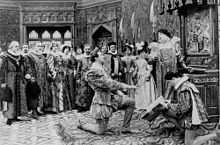Les Amours de la reine Élisabeth
| Les Amours de la reine Élisabeth | |
|---|---|
 Still from the film, showing Tellegen and Bernhardt | |
| Directed by |
Louis Mercanton Henri Desfontaines |
| Produced by | Louis Mercanton |
| Written by |
Émile Moreau (original play and script) |
| Starring |
Sarah Bernhardt Lou Tellegen |
| Music by | Joseph Carl Breil |
| Distributed by |
L’Histrionic Film (France) Famous Players Film Company (USA) |
Release dates |
|
Running time | 53 minutes |
| Country | France |
.webm.jpg)
Les Amours de la reine Élisabeth (The Loves of Queen Elizabeth), Les Amours d'Elisabeth, Reine d'Angleterre (The Loves of Elizabeth, Queen of England) or La reine Élisabeth (Queen Elizabeth) is a 1912 short 4-reel French silent film based on the love affair between Elizabeth I of England and the Earl of Essex. It was condensed from a play of the same name and directed by Louis Mercanton and Henri Desfontaines. It was shot in Paris and starred Sarah Bernhardt as Elizabeth and Lou Tellegen as Essex. Bernhardt (by then 68 - she said of the film "This is my last chance at immortality") and Tellegen were already romantically involved, and this was their second film together.
Its production company, L’Histrionic Film, was forced into liquidation by Pathé Frères during the film's production, but it was completed with funds from Adolph Zukor. Zukor also brought it to New York, where its US release (on State Rights basis, on 12 July 1912) was Famous Players Film Company's first film release, and convinced other American companies that feature films were commercially viable. Famous Players advertised "Famous Players in Famous Plays", later became Famous Players-Lasky, and then Paramount Pictures.
Queen Elizabeth had one of the earliest film scores, composed by Joseph Carl Breil for the production. However, the French film The Assassination of the Duke of Guise (1908), also known as La Mort du duc de Guise and L'Assassinat du duc de Guise, directed by Charles Le Bargy and André Calmettes, also had an original film score composed by Camille Saint-Saëns.[1]
See also
- The House That Shadows Built (1931 promotional film by Paramount)
References
- ↑ Davis, Richard (1999). Complete Guide to Film Scoring, Berklee Press, Boston. ISBN 0-634-00636-3, p. 17
External links
- Les Amours de la reine Élisabeth at the Internet Movie Database
- Queen Elizabeth at SilentEra
- Clip from the film at Encyclopædia Britannica